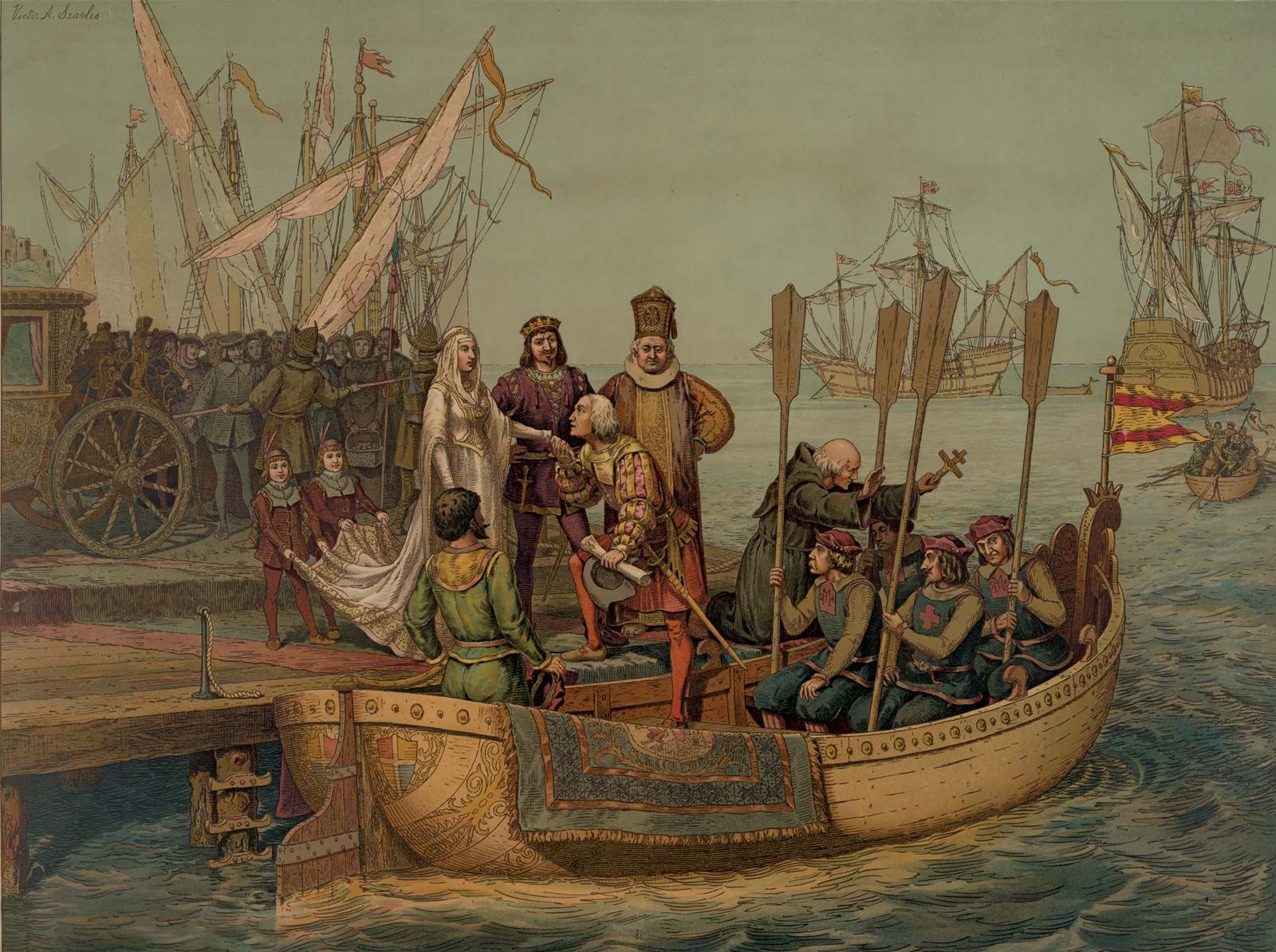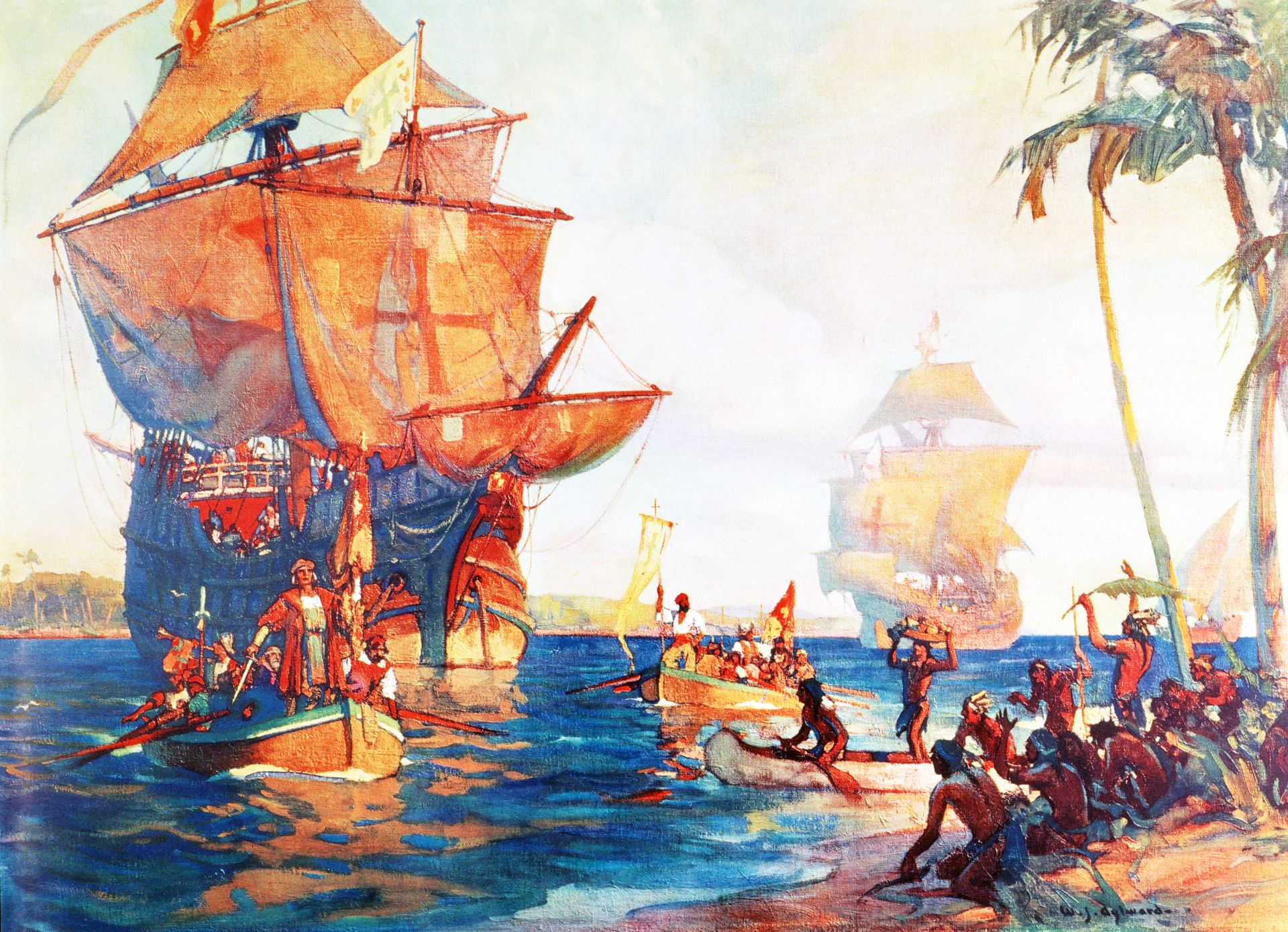He began to navigate at the age of 14. The early age at which he began his career as a sailor is not surprising for a native of Genoa, Italy who’s residents were known to be the most enterprising and daring of seamen.
He is supposed to have sailed as far south as the coast of Guinea before he was 16 and acquired a fair knowledge of astronomy.
He arrived in Portugal about 1471 and later, with the help of two priests who were faithful friends unsuccessfully tried to obtain the support of the King and the Duke of Medina Celi to discover the Far East by sailing Westward. This idea had been suggested by his brother Bartholomew who was a marine chart designer.
With the help of friends and his brother he also appealed to England and France who rejected the idea by a foreigner.
King Ferdinand at first had declined Columbus and his friends as he was fending a Moorish domination in Spain. On foot and reduced to begging, he sought to return to France and found shelter at a Convent where Father Juan Perez resided who was the confessor of the queen. After staying as guests, Columbus persuaded Father who then appealed favourably with Queen Isabella who, in turn, influenced King Ferdinand after a major victory against the Moors.
Columbus, Ferdinand and Isabella wanted fame and fortune but also sought an opportunity to export Catholicism to lands across the globe.
The Santa Maria, carrying the flag of Columbus, the Pinta and Nina carried 120 men. Before leaving, Columbus received the Sacraments of Penance and Holy Eucharist from Father Juan with his officers and crew following his example and they departed on August 3, 1492.
There was a general dissatisfaction and grumbling at the failure to reach land sooner as noted in Columbus’ and the Officer’s journals but dramatic tales of mutiny or insubordination are pure invention. Columbus had feared a revolt but none broke out.
On October 2nd they landed at San Salvador in the Bahamas. Arawak, who were friendly and widespread inhabitants, called the island Guanahani. Columbus discovered and explored the rest of the islands and part of Cuba with an establishment of a Spanish settlement on the Coast of Haiti. The admiral had learned over time of the existence of the American continent which he thought to be Eastern Asia and brought the news back to Europe as early as 1493. He displayed proofs of his discovery and the new country was thought to be rich in precious metals and treasures and therefore he was granted everything possible to enable him to continue his explorations even though Spain was poor at the time. His 2nd voyage included about 1500 men.
In his absence from the islands he found that his friends the Arawaks had been oppressed by seafaring Carib tribes from the south who carried off women and children into captivity and who practiced cannibalism. Columbus saw them as a threat to his spread of Christianity and his friends, the Arawaks, and he sought to defend them along with this new settlement.
Due to difficult acclimation to a new environment, Columbus became ill and weak which caused him to view things with discontent. There was a change in class of settlers for the colony and public opinion swayed against him and the expeditions. Convicts, suspects and doubtful characters headed to the new area to escape, caused conflict and applied much of the blame on Columbus. The monarch, hearing of the humiliating condition, reinstated Columbus as Governor of the Indies and restored faith in the future of the colony among the Spanish people.
Columbus’ mental health became greatly impaired and he was still convinced that the main land was Eastern Asia when he was granted a 4th expedition with his brother, his son and 150 men in 1502. He skipped the outposts of Haiti and headed towards the Honduras and coasted Central America hearing stories of another large ocean on the other side of a narrow strip which he thought was the Indian Ocean. In very ill health, having weathered many storms and inhospitable areas, he returned to Spain in 1504.
Columbus was a man of genius. He was bold, one of the most skillful of navigators and persistent in carrying out his original ideas. His impression he made on those with whom he came into contact shows he had great powers of persuasion and personal magnetism. He was deeply religious and insisted on the conversion of the pagan people that he discovered as one of his primary objects.



